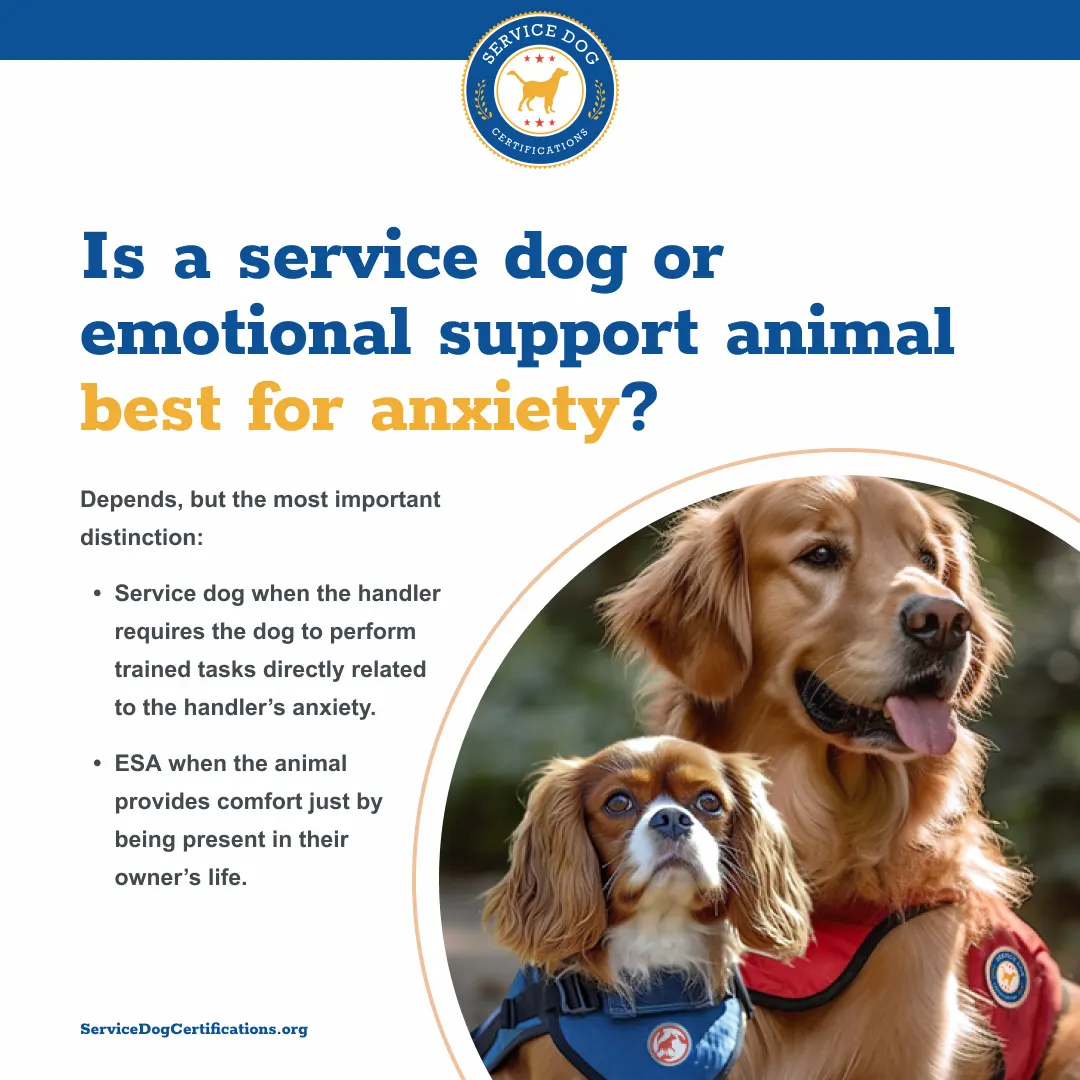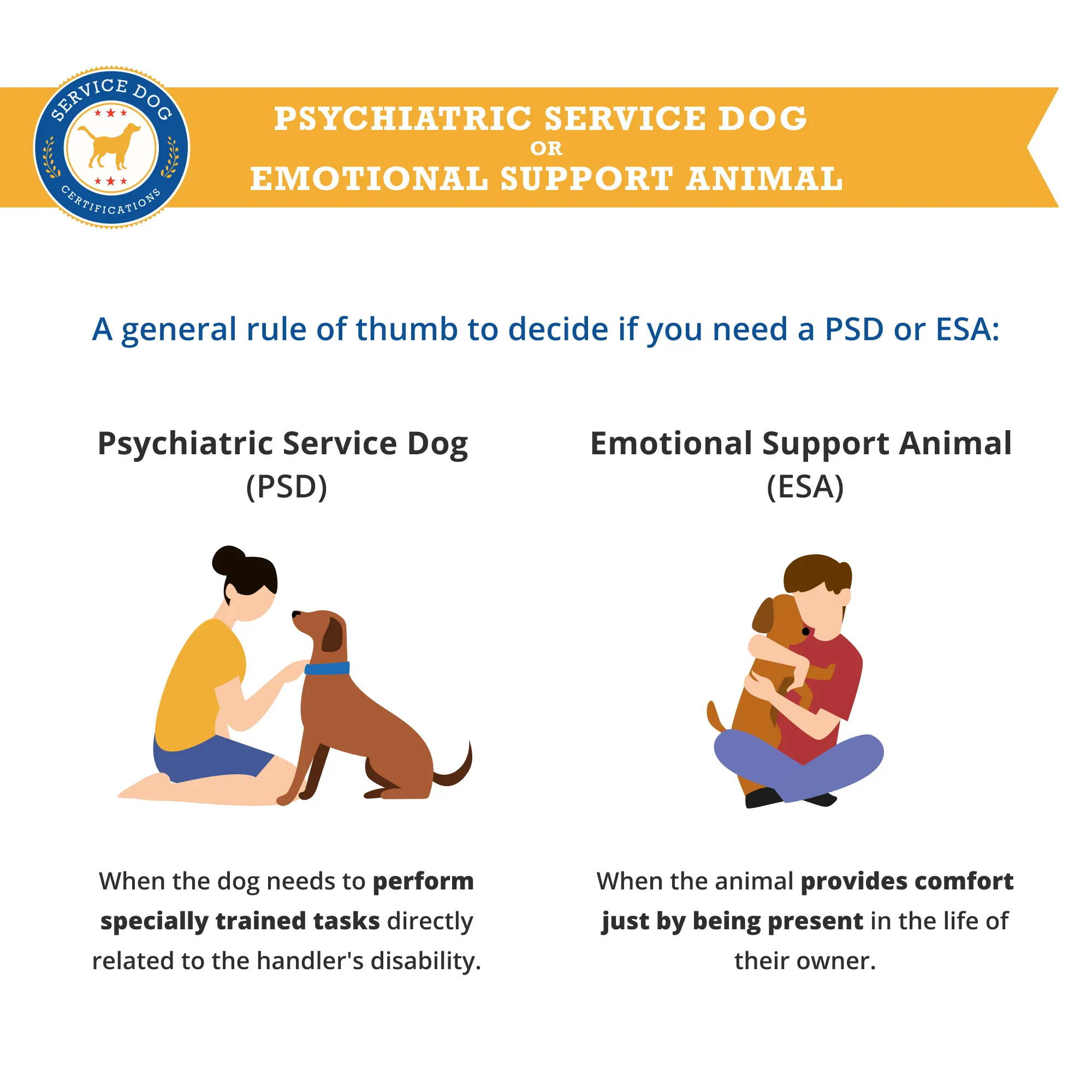Home Page › Blog › Is a Service Dog or Emotional Support Animal Best for Anxiety?
Is a Service Dog or Emotional Support Animal Best for Anxiety?

What is better for anxiety, a service dog or an emotional support animal? The answer depends on many factors, but perhaps the most important distinction is the following:
- A psychiatric service dog (PSD) is more appropriate when the handler requires the dog to perform specially trained tasks directly related to the handler’s anxiety.
- An emotional support animal (ESA) is more appropriate when the animal provides comfort just by being present in the life of their owner.
Who qualifies for a service dog for anxiety?
To qualify for a psychiatric service dog for anxiety, the handler’s condition must rise to the level of a disability. That means the handler’s anxiety (by itself or in combination with other disorders) must substantially impair a major life activity.
In addition, psychiatric service dogs undergo extensive training to learn a job or task relating to the handler’s condition. For example, an anxiety service dog can perform tasks like providing tactile comfort during times of crisis, interrupting panic attacks, or retrieving medication.
Psychiatric service dogs have the ability to venture into areas normally closed off to dogs. They also have housing rights – PSDs can live in housing complexes that ban pets without paying pet fees. PSDs can also fly in the cabin of airplanes free of charge.
Who qualifies for an emotional support animal for anxiety?
To qualify for an emotional support animal, the owner must also have an eligible psychiatric disability. However, the major difference between an ESA and a service dog is that an ESA does not need individualized training.
ESAs provide comfort for anxiety just by being around their owners. ESAs can also be many types of animals, such as dogs, cats, rabbits, birds, and fish. On the other hand, only dogs can qualify as service animals.
To qualify for an ESA, the owner must have an ESA letter from their licensed healthcare professional. ESAs have housing rights under federal law that allow them to live with their owners in no-pets buildings free of charge.
Final Thoughts
There are many things to consider if you want to pursue a service dog or ESA ownership for anxiety. You should ask the following questions:
- Do I need a dog or other type of animal?
- Does my disabling anxiety require a trained dog to perform specialized tasks?
- Do I need my dog for housing, travel, public access, or a combination?
- Do I have the ability to train or hire someone to train a service dog?
- Does my dog have the temperament and ability to be a service dog or ESA?
If you’re unsure whether your condition qualifies for a service dog or ESA, speak to your licensed healthcare professional. If you want to qualify for an ESA letter, you will eventually need the involvement of a licensed mental health professional. There is no documentation requirement for PSDs, but many owners find comfort in a PSD letter that affirms their need for a psychiatric service dog.

About the Author: The writing team at Service Dog Certifications is made up of folks who really know their stuff when it comes to disability laws and assistance animals. Many of our writers and editors have service dogs themselves and share insights from their own experiences. All of us have a passion for disability rights and animals.
Latest Posts

How to Bring a Service Dog to Disneyland
Trained service dogs are more than welcome to join their handlers at Disneyland. In this guide, we’ll explain Disneyland’s policies and give practical advice for bringing a service dog to Disneyland for the first time. Disneyland’s Service Dog Policies The Magic Kingdom is happy to welcome trained service dogs across most park locations! They kindly […]

Read More

Can Dogs Eat Tomatoes?
Yes! Dogs can safely enjoy tomatoes, but there are a few risks to be aware of so you can feed your dog responsibly. Fully ripe tomatoes (without the stems and leaves) can actually have nutrients that are good for your pup. Tomatoes have chlorogenic acid, an antioxidant that can have anti-inflammatory effects in cells. They’re […]

Read More

Can a Primary Care Doctor Write an ESA Letter?
Your family doctor, also called a primary care physician (PCP), can write a letter recommending an emotional support animal. We’ll explain what legally gives them that ability and explore what better options might be available for you. Why are Physicians Able to Write an ESA Letter? To turn your pet into an emotional support animal, […]

Read More






